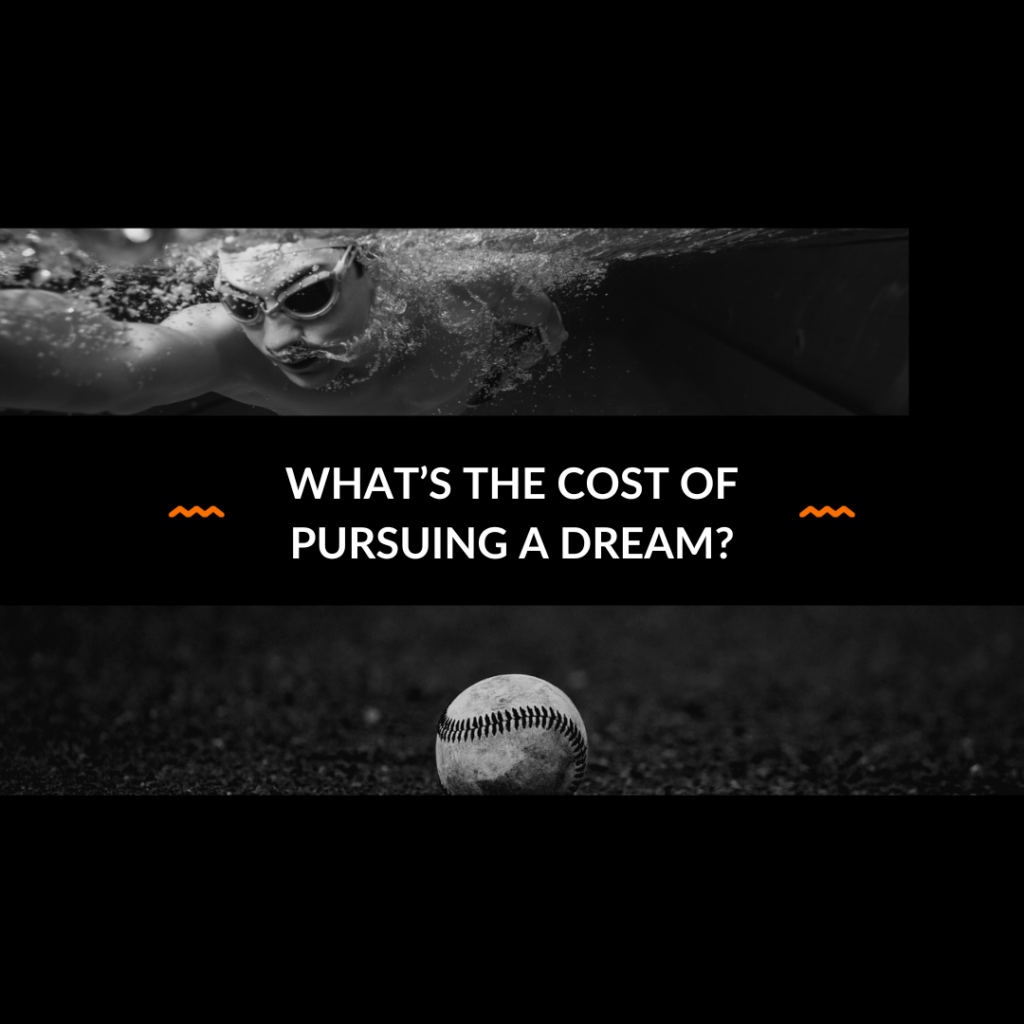A number of years ago, I took my daughter to a local art studio to have some daddy-daughter time. I can’t recall exactly how long ago it was, but my daughter was in grade school and it was likely before I returned to school for my master’s degree in sport psychology. It was certainly before I started my mental performance coaching practice.
I’m a kid at heart. When I take my kids to do kids stuff, I generally participate. I don’t like to just watch them. I don’t like to stare at my phone (I do that enough). I like to do stuff.
On this particular day, I felt compelled to be creative because we were in a creative environment. Plus, I’ve learned over the last 10-plus years that I’m actually a creative person even though I never considered myself to be for most of my life. It was also just an opportunity to try something new, which I love to do, but don’t necessarily go out of my way to do without a reason.
In this studio, you pick out a piece of kilned clay and choose to paint it how you want. I poked around the studio just like my daughter did to find something to paint. And then it hit me.
I found a piece that read “DREAM.” At that point in my life, I was definitely dreaming. I was dreaming of a new life for myself, but hadn’t quite figured out how I would make it come to fruition. I grabbed the piece and sat down to paint.

Fast forward five or more years and the finished “work of art” still lives in my living room reminding me to keep dreaming every day. I still look at it all the time. It helps me remember why I started and why I should keep going.
The truth is that I constantly need that reminder because dreams are a funny thing. Dreams are easy to have, but hard to reach. If we want our dreams to come true, then we need to do hard things on a consistent basis to achieve those dreams despite knowing there is absolutely no guarantee that we will achieve those dreams even if we do everything right.
It’s pretty much the same for athletes, doctors, actors and actresses, and even mental performance coaches.
About seven years ago, I chose to return to school to get my master’s degree in sport psychology. My vision was to own and operate a private practice serving young athletes and their families. My purpose was to help young athletes to reach their potential.
When I started school, I was full of energy. I took the first step to achieving my dream. I was energized at the prospect of learning something new. I felt like I was taking big steps toward achieving my goals. It was a great time in my life.
My first year of my master’s program was successful. I was learning so much. The quality of my academic work and my grades were excellent. I was feeling really good about my choice to leave behind an almost 20-year career and pursue a new life. What could go wrong?
After I completed the first year of my program, it was time to start working with young athletes. I needed to complete 200 hours of fieldwork training (i.e., internships) to get my degree and qualify for Certified Mental Performance Consultant® status upon graduation. I was really excited about the opportunity to finally do the work.
This is probably the first time that my perspective on pursuing my dream shifted. Things were getting more challenging. I had to find my own internships. My graduate program wasn’t helping me. I had to pitch myself to potential employers in order to get the work I needed. Luckily, I had sales experience, as well as the motivation to do whatever it took to find a placement.
My primary internship was at an all-boys high school in central New Jersey not far from my home. The athletic director was a young man fresh off retirement from his professional baseball career. He understood the value of mental training as he experienced it first-hand. Further, he jumped at the chance to have a free resource available to his athletes, many of whom were expected to compete in college.
I couldn’t help but feel like I was set up for success. I got lucky and found the right school with the right sponsor. I was confident that things would go exactly the way I hoped based on a very encouraging start. And, of course, I was wrong.
I spent my first season at the school with the varsity basketball team. A highly decorated New Jersey basketball program that has produced not only Division I players, but NBA players. I was really excited.
Except the head basketball coach wasn’t bought into my involvement one bit. He didn’t know me. He didn’t understand sport psychology. And frankly, I don’t think he wanted me around. I showed up to games that were canceled for weather and no one told me. I’d show up at practice daily, rarely saying a word. I watched. I rebounded basketballs. I took notes. I learned from afar.
However, just observing was not helping me get the “contact” hours I needed working directly with athletes. I needed 200 hours working with the team or individuals directly on sport psychology training. I may have gotten 10 hours from that first season after attending 30 games and probably 100 practices. That was not ideal and definitely not how I planned it.
I was starting to learn that achieving my dream was going to be a lot harder than I imagined it at first. It took me two years instead of one year to complete my internship requirements. I probably spent over 1,000 hours at that high school (and at other internship placements), and was paid a grand total of ZERO dollars while doing it.
So, if you are keeping score, up to this point in the story…
I quit my job and cut my non-sport psychology income by about 80%.
I spent three years and a lot of money to get my master’s degree.
And, I did not get paid one nickel to perform over 1,000 hours of sport psychology services.
In March 2020, I finally graduated with my master’s degree. I was recognized as the top student in my class. I did it. I was ready to start my mental performance coaching practice.
Oh wait, what else happened in March of 2020?
COVID. Swell. I was also in the middle of a divorce.
This is not an ideal set of circumstances for starting any kind of new venture unless you are selling vaccines or you are a divorce attorney. I was neither.
I needed to keep going, so I chose to offer my services to the local high school’s varsity soccer team free of charge to get some experience and perhaps get a client out of it. Awesome. More free work. However, that’s what I needed to do to keep going at that time. It was better than sitting around waiting for the phone to ring because that probably wasn’t going to happen.
That non-planned, unpaid internship turned into my first three paying clients.
OK, progress. A small taste of success. It felt good, but it didn’t take long to figure out that I needed at least 10 times more clients to even have a chance of surviving in private practice.
In my graduate program, I was required to complete an “applied project.” I decided to write a marketing plan to fulfill that requirement because I knew building my private practice was Plan A, B, and C. Beyond that, I knew very little about marketing at that time. It seemed like a logical choice and having a marketing plan could have practical value in the long-run.
The marketing plan came out well. I did a lot of research and developed what I thought was a great plan. I was going to use social media and word of mouth marketing to grow my business in my local area because of the demographics. Easy!
Not easy.
You actually need to have content to market your business. I had no content. I had to start creating useful information to share with potential customers to get them interested in using my services. So, I started The Freshman Foundation® Podcast from scratch (in my infinite wisdom). I knew nothing about podcasting other than that I enjoyed listening to them. I came up with the concept for The Freshman Foundation® based on my experiences working with high school athletes that were planning to compete in college.
I was really excited about the podcast. It would give me:
- The opportunity to explore a subject that I was very curious about – the transition from high school to collegiate athletes.
- Create interesting content that I could share with the audience I was trying to establish.
- Express my creativity through creating a podcast from scratch.
All great things. Except, it wasn’t cheap. Starting a podcast required a relatively significant investment for a business that wasn’t earning very much at the time.
One more scoreboard check…
I spent three years and a lot of money to get my master’s degree.
I did not get paid one nickel for over 1,000 hours of interning.
I was earning basically nothing and I took a lot of money out of my pocket to start a podcast, which I knew nothing about.
Got it.
OK, OK. You get the point by now.
Dreams are great to have. We need them as motivation. A sport psychology professional calls this extrinsic motivation.
Making those dreams come true is hard. Doing so requires an immense amount of sacrifice and heartache – at least from my experience.
I’ve had to resist the urge to quit along the way because the costs – financial, time, energy – have outstripped the benefits. Some days, I don’t get rewards or any sort of feedback. It’s just a black hole. Continuing to move forward can be really challenging under those conditions. At times, I have to seek out feedback even if I don’t want to hear it just to keep things moving forward.
The only constant over the course of the last six and half years is having that “DREAM” literally staring me in the face every single day reminding me to keep going. It reminds me of why I picked up that paintbrush in the first place.
My ability to keep going as long as I have is a direct result of aligning my daily actions with my long-term vision and sticking to it as consistently as humanly possible. I definitely have some down days. I don’t beat myself up over it. However, I also need to know that there are consequences to doing so – I can set myself back. It’s the same message I share with any of my athletes. Make a choice and accept the consequences. There is not much point on dwelling on the result because you can’t change it.
I try not to talk to my athlete clients about my personal experiences, well, because it’s not about me. However, I relate so much to them because our pursuits are very similar in my view. I’m fortunate that I get to help my clients pursue their dreams because it helps me too.
Remind yourself of WHY you are sacrificing. Do something every day that aligns with your dream. If you don’t, it’s okay. Learn from it and keep going. Don’t stop.
That’s exactly why I wrote this piece.

